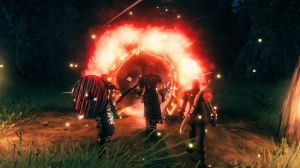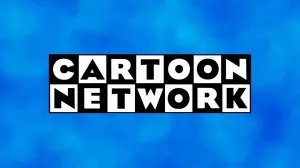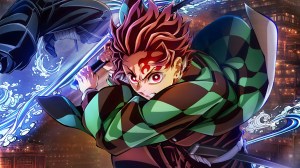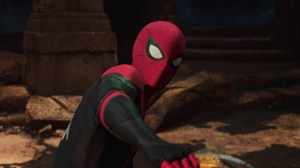
Jupiter’s Legacy, one of the biggest hits at Image Comics in recent years, makes its long-awaited return at the end of June. The superhero epic spanning three generations of characters will resume its narrative as Jason and his family prepare to fight back against the heroes who previously seized control of the world. Volume two of Jupiter’s Legacy will also avoid the delays that plagued the first five issues with art for the second half almost entirely complete already. It promises to be every bit as exciting and thought-provoking while also providing readers a new installment every month, and will up the profile of the comic, which just had its film screenwriters officially announced this week.
Videos by ComicBook.com
ComicBook.Com sat down with the series writer Mark Millar to discuss the return of Jupiter’s Legacy and what he hopes to achieve with the series.
Looking at the start of the second volume of Jupiter’s Legacy and the new series Empress, children are playing a larger and larger role in the stories you write, specifically as a source of hope and change. Do you see your role as a father impacting your work more as you go on?
Mark Millar: It’s not something I notice overtly, but it is something that has been pointed out to me. It was never intentional, but I have found as an audience member that I am drawn to things that are more hopeful. I think it’s reflected in the times as well. Anything that’s very, very dark seems to belong to the previous decades. The pinnacle of that was probably 2008 when you had stuff like The Dark Knight. Even by the time The Dark Knight Rises came along, audiences seemed more into the buzz of The Avengers. People wanted a bit of levity and something more upbeat in their entertainment. It’s fascinating because as a culture we’ve done it very gradually without realizing we have.
If I look at something I would have done in 2009 or 2010, it’s very dark. Jump forward to something in 2014 or 2015 and you’re looking at comics like Starlight and Chrononauts. Even Jupiter’s Legacy starts where my head is in a darker place, then you start to see the transformation in the story when the child [Jason] shows up and see the darkness turning to light. It becomes the opposite of what the construction of superhero comics had been about for the past 30 years, which is something nice turning into something dark. It’s the opposite as something dark is forced into the light.
You really get a sense of that transformation at the end of the first volume in the big superhero styled battle royale, where the family comes together and Jason becomes the lead character of Jupiter’s Legacy. Is that a promise you’re looking forward to paying off in the second volume?
Millar: There’s something about a super powered kid that’s a lot of fun. People always say when they’re writing about Batman, it becomes an entirely different book when they do Robin. With a kid standing beside him the tone changes. Spielberg used to put a kid in all of his movies, from the late 70s to the early 90s, during that era of his family films. They were always the character that kept it all from getting too dark and serious. It really does work.
It’s something I could relate to as well. When I was a child, I used to read lots of Superboy. Superboy was a really exciting character to me because he was kind of like Superman, but he had some of the things we dealt with as children like going to school, packed lunches, and bullies. There’s something fun about writing those characters and it has been a long time since we’ve seen them. For the last 20 years, if you see youthful characters in superhero comics they tend to be very forcibly cool. Nobody is allowed to just be a kid. There will always be a musical thing included about 10 years too late and the kids are always talking in that dialogue only 40 year old men write for kids.
I liked the idea of having a young superhero character in Jupiter’s Legacy because it had been quite a long time since I’d seen something like that.
That’s part of the joy of being a kid. You don’t have to even know what it means to be cool. You can be goofy and silly and entirely yourself.
Millar: Exactly. I never liked Superman because he was cool. I liked Superman because he did nice things. I didn’t watch Superman: The Movie hoping he would do something cool; it was enough that he rescued people.
I think “deconstruction” is a word we still hear bandied about a lot in regards to superhero comics,and I’ve heard it used in reference to Jupiter’s Legacy. That’s not the right word for it though. Looking at the comic and what you’re saying now, it works as more of a “reconstruction” of the genre.
Millar: That’s a perfect description. The whole point of the series is to show the things that were thrown away in my lifetime, like secret identities and secret headquarters. There are very few characters even at Marvel who have secret identities anymore, but it’s such an intrinsic part of what makes these characters work.
There’s lots of old school things that I’ve tried to put a modern spin on and bring back. I’m trying to show the whole point of a superhero costume is so you know who’s on your side in the middle of a big fight when everybody is moving at super speeds. The whole point of secret identities has been explored in the series as a place to hide when you’re in danger.
Those concepts are certainly on display, especially with how many characters there are in Jupiter’s Legacy. There were a lot of heroes in the previous volume and the cast only grows in the upcoming issue. You’ve already expanded this story and universe some with the Jupiter’s Circle series. Do you intend to keep having stories set in this world or is its fullness there primarily to enhance the story you’re currently telling?
Millar: I’d like Jupiter’s Legacy to be self-contained. I’m going to use other writers on other projects, but this one feels like a finite story to me. Jupiter’s Legacy is essentially a revamp of the idea of what a superhero was after the late 20s, that reconstruction idea. What I wanted to do what with Jupiter’s Circle was show a country club sort of thing with a bunch of middle-aged professionals who were agents of the status quo. It seemed quite interesting to explore that as well and have it set side-by-side.
I have another “Jupiter’s” book I plan to do in about five years time, and that would be the third volume in this trilogy. You would have Jupiter’s Circle, Jupiter’s Legacy, and then this third one I’m planning. It’s an entirely different thing set in the future whenever Jason has grown up. I was inspired by Sergio Leone who I heard had a plan for Once Upon A Time In The West and Once Upon A Time In America, where he would follow them with Once Upon A Time In The Future. I loved the idea of something that had a huge scope like that spanning three volumes.
You mentioned Jupiter’s Circle as having a country club aesthetic, and looking at both the characters in that story and the heroes at the start of Jupiter’s Legacy there’s a monochromatic effect to them. The new heroes being recruited at the start of the second volume are much more diverse in what appears to be commentary on the superhero genre.
Millar: Oh, definitely. I’ve been at shows where I will see little kids who are all dressed in costumes of characters who have always been white. Something struck me as I saw this a couple of years back, and this was before Marvel and DC had started to mix it up a little bit. I thought it must be kind of weird if you were a little black kid and you don’t see any superheroes who look like you. There’s Blade who hunts vampires, but there isn’t really somebody in the Justice League or The Avengers. It stayed with me and I knew if I made a superteam I’d make it a massive multi-racial thing. White people are in the minority on planet Earth so if you’re going to have a 21st Century superteam, white people would be in the minority and you’d have a real mix of everyone. I thought it was important to have a gender balance in there too since women are 52% of the planet. It seems odd that radioactive spiders only target men.
That has become more apparent in your recent work, both in Jupiter’s Legacy and Empress. Empress parallels Starlight in some ways focusing on a grand, pulpy, sci-fi adventure, but placing a mother in the spotlight rather than a father figure. Is that part of your decision making process in telling these current stories and developing new ones at Millarworld?
Millar: Yeah, it’s interesting because I now feel there’s something a little boring about having more 30-something year old, male, white leads. I feel that demographic has been taken care of quite well. There’s no 30 year old white guys thinking there’s no one they can relate to in comic books. So I felt as if it was important and interesting to write stories about different ages and genders and everything else. It’s just more interesting because you’re automatically telling a very different type of story. Making someone a mother completely changes the dynamics. I’ve done it to some degree subconsciously and some degree consciously, but I’m finishing off another script this week with Greg Capullo that features a female lead. The big thing I’m doing with John Romita, Jr. features a female lead too. I don’t know if it’s because I live in a house filled with women; I’m surrounded by little ones running around. It just seems natural for all of my comics to be starring women as well. A comic about an old guy getting superpowers, that seems a lot more interesting than a young man getting them. It seems more interesting.
Plus, the role of the heroic mother is something we’re missing in pop culture. We see heroic mothers in low budget films, but we rarely see them in big blockbusters. Hit-Girl, Katniss, and all of those who have come out in the past 5 to 6 years have shown us the heroic teenage girl, heroic unmarried women. But I thought wouldn’t it be quite interesting to actually have more women who aren’t in just those boxes. The only time I can think of it really was Ripley in Aliens as a surrogate mother looking after Newt. It was really interesting, but it still wasn’t a biological thing. We’ve covered almost every other base in sci-fi, but the heroic mother.
There seems to be a real desire and interest in that character type too. You only have to look at the success of something like Mad Max: Fury Road which is a blockbuster built around heroic mothers. It’s something that’s delivered very well in Jupiter’s Legacy too. The finale of the first volume delivers a tremendous scene when Jason’s mother arrives to protect him.
Millar: It’s the most primal thing of all, the idea of your mom showing up to save you when you’re a kid. She’s there for you at your lowest.
It’s the kind of thing that when delivered well can still get you teary eyed as an adult.
Millar: I’m really pleased with that moment. It’s something we’ve never seen in a superhero comic before where mothers have always been relegated to very traditional roles. They either get shot outside the cinema or wind up making Superman’s costume. It’s fun to write.
That moment speaks to something that Jupiter’s Legacy has done really well in creating very compelling visuals. In superhero comics you get used to seeing the same iconic moments and familiar looks because they’ve sold books for so long, but they also become repetitive. Frank Quitely has really pushed himself to provide new concepts and ideas that both pack a punch and feel fresh here.
Millar: He finds it impossible to do something you’ve seen before. It’s not in his lexicon to repeat something that has happened. Whatever I give him, even if I see it in my head like an old comic I read in the past, he gives the page back and it’s from an angle I never anticipated.
He’s a master, and I would never say this to his face, but he does absolutely incredible work.
So looking at the five remaining issues of Jupiter’s Legacy beginning to ship in just a few weeks, what has you most excited about getting yours and Frank’s and Sunny [Gho]’s work out there?
Millar: On a very basic level, to have monthly Frank Quitely on a superhero comic is the most exciting thing I can imagine. Everything the guy has done for the last 20 years has been gold. I can’t think of anyone people get more excited about seeing the artwork for. Part of it is the scarcity of him, but 90% of it is the fact that the guy is a bloody genius. He is so great.
This is also my last big superhero story that I’m feeling a burning desire to do for a little while. I’m doing some other things at the moment and have veered more into sci-fi. Everything I wanted to say about superheroes is in this. And because it’s something I own I was able to cut loose and go crazy with it. To be working with an artist who is as much of a genius as Frank Quitely and to have the kind of license that gives me that you couldn’t have with company-owned characters, it makes this a dream project. I suspect that at the end of my career this is the project that will probably have gone down best, will have had the most impact, and I’ll certainly have fond memories of. I can’t wait to share it with everyone.
Speaking of sharing the book with everyone, is there a sequence or panel you’d care to share with everyone from the upcoming issues of Jupiter’s Legacy?
Millar: I love this sequence because it’s such an old fashioned idea, the notion of a subatomic hero riding a molecule, but nobody draws subatomic heroes riding molecules better than Frank. The weight of this is just perfect. I want to tattoo this to my chest

The final order cutoff for Jupiter’s Legacy #1 (vol. 2)is Monday, June 6th. Be sure to pre-order from your local comic store and pick up the issue when it arrives on Wednesday, June 29th in stores and online.
Chase Magnett is a freelance journalist, critic, and editor working with comics, film, and television. He has been hooked on comics since grabbing an issue of Suicide Squad from a back issue bin fifteen years ago. When Chase is not working with comics in some way he spends his time rooting for the San Francisco 49ers and grilling. He currently contributes to ComicBook.com and other outlets.








